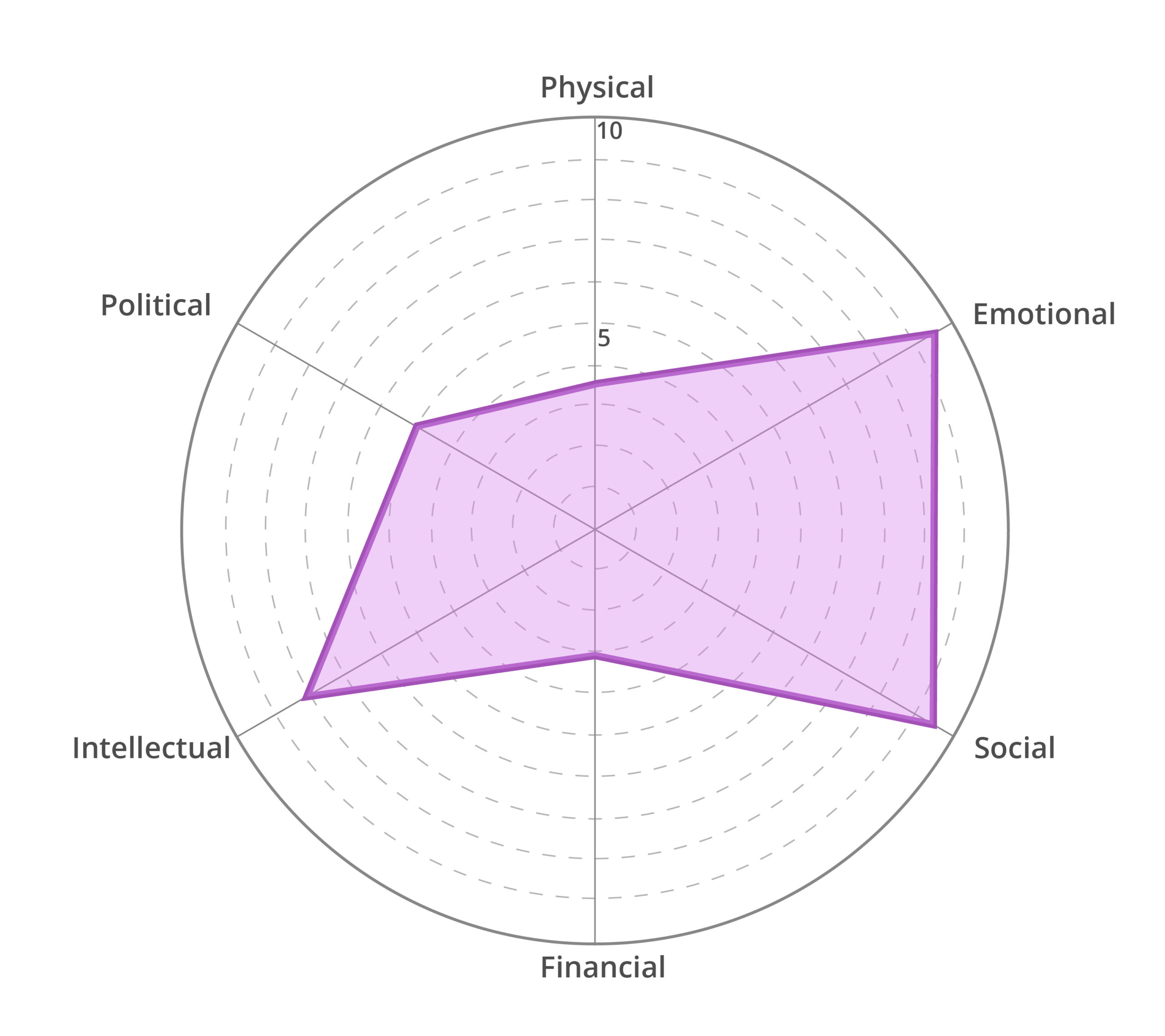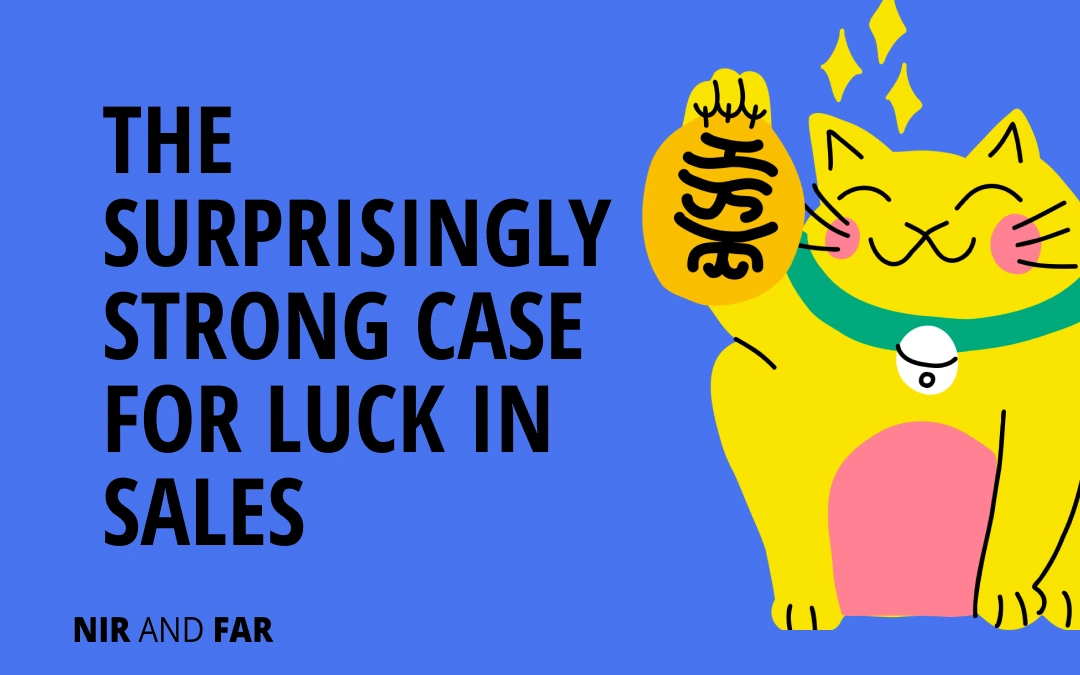My wife and I started our first business together in 2003. We sold solar panels in Long Island, New York, which meant making thousands of in-home sales calls.
Before we entered a potential customer’s home, we had a little ritual. We always looked at each other before we opened our car doors and said, “Let’s go sell a solar system.” It was cheesy and a bit silly, but somehow, we had to say it, or we thought we’d be jinxed and lose the sale.
Though we didn’t know it then, we had tapped into one of several practices that research has shown salespeople can use to close more deals. It turns out there’s a science to superstition, and whether the supernatural exists or not doesn’t really matter. At the end of the day, there are practices anyone can use to increase their business’s good fortune.
The intersection of luck and sales success isn’t just anecdotal. It’s backed by rigorous research. After a decade-long study, psychologist Richard Wiseman concluded that some people truly can engineer luck. Dr. Tina Seelig at Stanford University developed a systematic approach to increasing good fortune in business ventures. Joël Le Bon, professor at Johns Hopkins University Carey Business School, has extensively researched how luck affects sales.
Their research shows that luck exists and can sharpen salespeople’s competitive edge. Here’s how:
How Salespeople Make Their Luck
All three experts have discovered that luck comes only after effort.
In his research, Le Bon calls this “provoked luck”: “unexpected events that come about because their strategic behavior has maximized the opportunities.” Their “strategic behavior” could include sales activities such as making phone calls, taking meetings, qualifying, and gathering intelligence on prospects. His interviews with experienced salespeople and a study of sales students revealed that provoked luck played a huge role in their success.
Le Bon’s study of 250 university sales students produced striking results. Out of the total sales generated by all students, approximately 60% came from lucky circumstances. Of those lucky sales, between 76% and 88% resulted from “provoked luck,” meaning the students’ strategic actions created the conditions for luck to occur.
Len Bon wrote in HBR that harnessing luck comes down to belief. Whether luck really exists doesn’t matter; whether a salesperson believes luck exists does.
If salespeople—be they real estate agents, mortgage brokers, or insurance salespeople—believe that if they put in the work, luck will come to them eventually, they will complete more sales activities. Thus, a salesperson who believes in luck will complete more sales activities, which causes more opportunities, which increases their provoked luck, which leads to a higher chance of success—ultimately reinforcing the salesperson’s belief in luck.
Le Bon says feeling lucky improves salespeople’s performance and builds self-assurance, optimism, and resiliency in the face of failure.
Wiseman determined through his 10-year study that there are four characteristics of a lucky person:
- They are open to opportunity, pursue it, and make the most of what comes their way.
- They trust their intuition.
- They are optimists, which acts as a self-fulfilling prophecy.
- They are extremely resilient (which Wiseman says is the most important of the four)
Based on those characteristics, Wiseman developed a “luck school” that taught people how to grow their luck.
Dr. Tina Seelig identified three ways people can “build a sail that captures the winds of luck”:
- Get out of your comfort zone and take risks.
- Show appreciation to those who help you or engage with you.
- Don’t think of ideas as good or bad. Look at them through the lens of possibility.
Find Luck Outside Your Comfort Zone
“Salespeople should be encouraged to disrupt their habits, get out of their routines and comfort zones, and meet new people,” Le Bon wrote in HBR. “They should do new things, expand their networks by going to unusual places, and build new alliances. In sales, opportunities lie not among the people you know but among those you don’t.”
One salesman told Le Bon that he had won back an important account he had lost by helping a client of the account, who later spoke well of him. He regained business just by nurturing his network.
To encourage her students to push their limits, Seelig has them fill out a risk-o-meter to determine their willingness to take risks. She then asks them to do one activity outside of their established comfort zone.

Tina Seelig’s “risk-o-meter” from What I Wish I Knew When I Was 20
Sales managers can use that risk-o-meter to help salespeople navigate sales activities they would otherwise avoid.
Seelig has her own sales story of how risk-taking led to luck: She started a conversation with a stranger on a plane who turned out to be a publisher. During that flight, she pitched him a book proposal that he rejected on the spot. But Seelig continued to nurture the relationship with him—inviting him to speak to her college class on the future of publishing, sending him videos of her students’ projects—and, eventually, she sold that same book proposal to an editor who was a coworker of that publisher. That book, What I Wish I Knew When I Was 20, sold 1 million copies within two years.
Research Makes You Lucky
Le Bon advises that sales teams be trained to seek knowledge about customers, prospects, competitors, and the overall market. This knowledge helps salespeople be smarter and luckier by opening them up to unexpected opportunities and increasing their luck.
According to Wiseman’s study, people who immerse themselves in learning and networking within their fields are well-connected, aware of their surroundings, and, thus, more likely to notice opportunities.
Feeling knowledgeable is also a boon for salespeople because it increases their confidence in interacting with and pitching their clients.
When I worked at Boston Consulting Group fresh out of undergrad, I had to get up to speed on many topics to excel at my job. I figured out a way to learn any subject so I could go from feeling incompetent to confident.
One study found that organizations with a system of knowledge sharing among employees become more agile and perform better; knowledge-related agility may help them recognize and react to opportunities.
Showing Appreciation Improves Your Good Fortune
According to Seelig, everyone who helps you on your journey plays a role in getting you to your goals. Not showing appreciation is a missed opportunity.
At the end of every day, Seelig reviews her calendar and sends thank-you notes to everyone she interacts with that day. This practice fosters gratitude, appreciation, and luck, she says.
Salespeople can use this tactic with their existing and prospective accounts, helping them develop strong working relationships.
During her TED Talk on luck, Seelig shared another story about the power of appreciation. She once received a thank-you from a student who had been rejected twice from an entrepreneurial fellowship she oversaw. The student thanked her for the opportunity and said he learned through the application process. The note moved Seelig so much that she invited the student to chat over coffee and ultimately decided to advise him on an independent study that he later turned into a business.
Optimistic People Are Luckier
Having a positive outlook pays off. As Wiseman said, optimism is a self-fulfilling prophecy that drives success. My wife and I felt somehow more optimistic and confident when we said, “Let’s go sell a solar system,” before attempting a sale, and I know that reflected in our interactions with potential customers.
One study showed that the “psychological resourcefulness” of optimism and resilience helps salespeople to build better customer relationships. That, in turn, boosts their sales performance. The study found that optimism and resilience correlate with “more diverse, exploratory, and novel behaviors,” which enables salespeople to use creative problem-solving to meet their customers’ needs. Salespeople with these skills may be “luckier” in overcoming challenging sales situations.
According to the study, sales managers can help their salespeople become more optimistic and resilient. They can foster psychological safety among their team and have honest conversations about challenges, such as the constant rejection salespeople face. For example, after a failed cold call, managers can help salespeople recover from the sting by “separating the immediate adversity from deeply held beliefs” that they are ill-qualified, assuring them that the rejection is not “a personal insult or sign of wrongdoing.”
Le Bon suggests that sales teams can also foster optimism by encouraging salespeople to set high goals, such as beating their past performance or securing a meeting with a dream account. This kind of goal makes salespeople more creative and strategic and “drives forward-looking behaviors.”
Fail better
Salespeople face rejection all the time—it’s part of the job. But staying positive in the face of failure isn’t just a good idea; it’s a strategy. Wiseman says that resilience is the most important of the four characteristics of a lucky person because it allows them to reframe “bad” luck as opportunities.
My wife and I learned this firsthand when we sold solar panels. Not every homeowner was a match for our product, for whatever reason; in those moments, it was easy to feel like the door had slammed shut. Instead, we looked for a window. Though we’d lost the sale, we’d ask if the homeowner wanted a referral to one of our competitors who sold electric heat pumps. At first, our competitors were baffled—why would we send business their way? But soon, they started sending potential solar customers our way as well. Eventually, we took it a step further and trained their sales teams to sell solar panels on commission. By rethinking competition as collaboration, we turned our competitors into one of our biggest sales drivers.
Le Bon says sales managers should encourage their teams to set failure goals, such as X number of sales calls that resulted in no deals. This prevents people from feeling ashamed about failures and prevents salespeople from overfocusing on the end goal of reaching a certain sales number, which can sap motivation.
Free Habit Tracker
Design your ideal day and build your best life.
Your email address is safe. I don't do the spam thing. Unsubscribe anytime. Privacy Policy.
Seelig’s approach to making her students more resilient is to ask them to describe failure. Usually, students have very different answers, which helps them understand that failure can be reframed into something more positive. “They start realizing that’s something they can shape and change,” she said in an NPR interview.
Luck isn’t just something that happens to you. It’s something you create. A little reframing, a little persistence, and a lot of resilience can turn tough breaks into breakthrough moments. In sales, luck doesn’t just close deals—it keeps them coming.
Related Articles
- Schedule Maker: a Google Sheet to Plan Your Week
- Habit Tracker Template in Google Sheets
- The Ultimate Core Values List: Your Guide to Personal Growth
- Timeboxing: Why It Works and How to Get Started in 2024
- An Illustrated Guide to the 4 Types of Liars
- Hyperbolic Discounting: Why You Make Terrible Life Choices
- Happiness Hack: This One Ritual Made Me Much Happier

